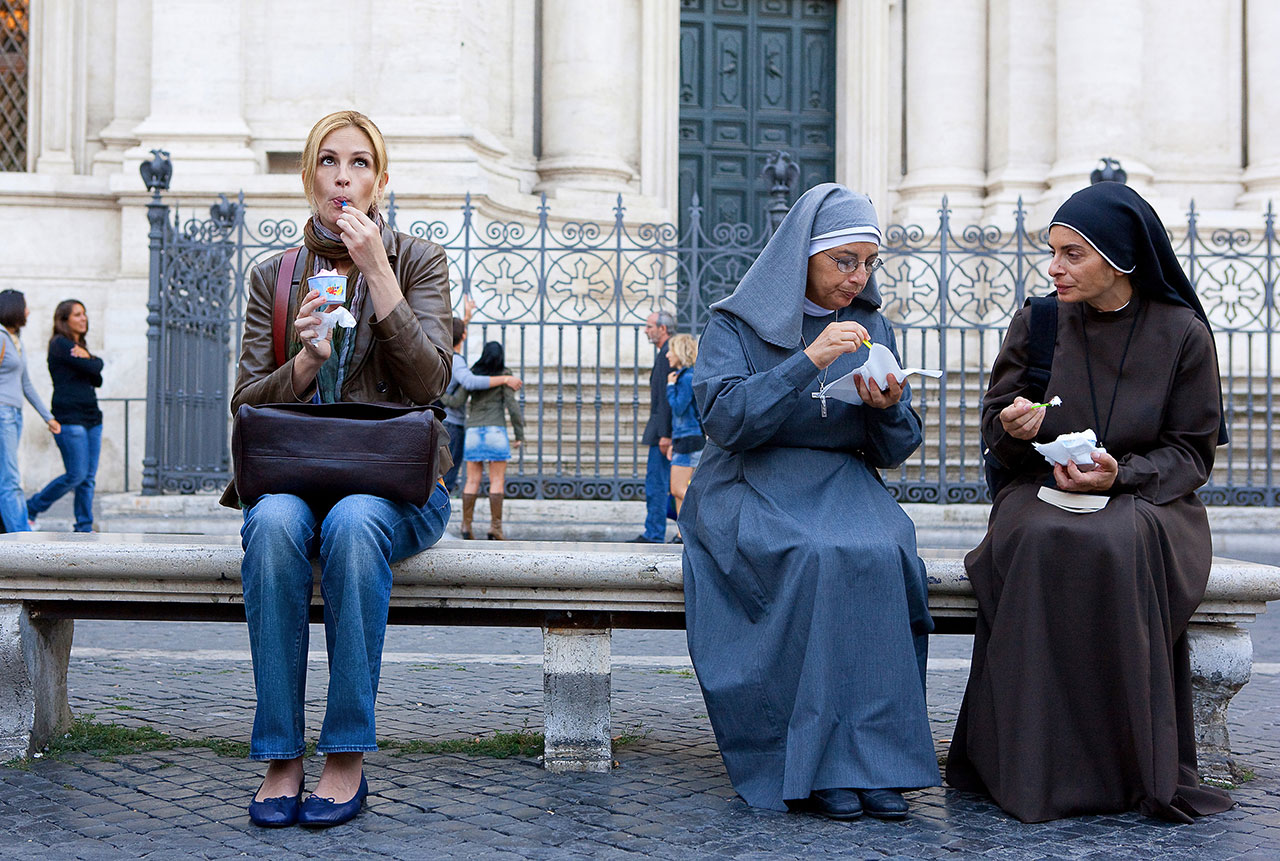News feed
In this exclusive extract from ‘Eat Pray Love Made Me Do It’, a new anthology that brings together the stories of those whose lives were changed by Elizabeth Gilbert’s global phenomenon ‘Eat Pray Love’, writer Laurie Granieri reflects on her quest to find peace in the imperfect, and why Good Enough will always be exactly that.
Read Elizabeth Gilbert’s exclusive reflections on a decade of her memoir here.
For one solid week, it is 10:26 in my apartment.
The red clock in the living room has stopped, and it stays stopped. Every time I look, there it is: 10:26, all day long.
Eventually, I unfold the Lilliputian screwdriver on my Swiss Army knife, which also happens to feature a pair of tweezers that keeps my brows from going full-tilt Frida Kahlo. I perform some lefty-loosey action on two stubborn metal screws, pry open the backside of the clock, insert a new battery and make it 8:12.
Before I read Eat Pray Love, a week of 10:26 would have been unfathomable. Because 10:26 would exist as a 24/7 reminder that something was wrong, out of place, out of time. Back then, I’d rectify this brokenness by 10:29 at the latest. Eat Pray Love spurred my conversion from the stringent dogma of Perfectionism to a scrappy faith in Good Enough. Now, ‘conversion’ doesn’t mean I experienced a full-bodied, come-to-Jesus moment down by the riverside. I did not see The Light. This new approach has emerged in fits and starts. But it’s here.

Julia Roberts in a scene from the 2010 adaptation of Elizabeth Gilbert’s memoir, Eat Pray Love
Credit: Collider
Bruce Springsteen recorded a song in the late ’70s called Ain’t Good Enough for You. That poor schlub: He does everything to please his girl. He gets a job in sales, buys a shirt at Bloomingdale’s. No dice—she doesn’t like the way he walks or the way he talks. “A little about Perfect and Imperfect: In 2004, within ten weeks, I divorced, sold my house and lost my big brother. I was caught in a tsunami of pain.”
Eventually, I began suffering debilitating back pain and twice-weekly migraines. I was working in the crumbling newspaper business, watching helplessly as colleagues were escorted from the newsroom on a regular basis. It was as if I were squirming on an eternal chopping block. Who was next? Joy, even when it did show up, was totally suspect and all too brief. It’s easy to forget, but Gilbert embarked on a year abroad with only a dim hope that she’d emerge whole. She didn’t know the end of the story. Who could predict a pearl of blue light and a loving Brazilian man, let alone Oprah Winfrey and Julia Roberts?

Julia Roberts in a scene from the 2010 adaptation of Elizabeth Gilbert’s memoir, Eat Pray Love
Credit: Collider
My own conversion from Perfect to Good Enough involved setting out on a path that held zero guarantees. I always relate to that distressed father in the Bible who cried: I believe; help my unbelief! In other words: I want to trust you, man, but I’m not sure I can put one foot in front of the other. I’m not certain if it’s even worth lacing up my boots. I spend most of my life curled up in that semicolon between “I believe” and “Help my unbelief!” and when I’m there, Gilbert’s own uncertainty keeps me company. She had no reason to believe anything would come of this journey, beyond a manuscript and a few passport stamps.
Still, she laced up her boots.
Eat Pray Love nudged me to lace up my own, but at the same time it gave me permission to come undone; to every so often ignore an e-mail, skip a workout, take a nap. I figured I had good reason to live a righty-tighty life, in which I was forever furrowing my brow, checking my watch and doing my damnedest to reach Perfect by lunchtime.
When I was growing up, women who rested seemed depressed. They lay on their right sides atop efficiently made beds and zoned out on The Price Is Right and The Young and the Restless before returning to the daily business of serving others. Rest seemed akin to giving up. But Gilbert writes convincingly about rest, and about mothering one’s joy—nurturing and protecting it. Sure, Gilbert visited a medicine man, but she administered her own remedy. As for me, my yearlong migraine odyssey involved a neurologist, a Reiki master, two acupuncturists, a handful of chiropractors, staring at mandalas in the local library, screaming in the car (to relieve the pressure—I figured, why not?), a brief hospital stay and a boatload of meds and research before I found a nutritionist who was able to alleviate most of my headaches.

Julia Roberts in a scene from the 2010 adaptation of Elizabeth Gilbert’s memoir, Eat Pray Love
Credit: Collider
Gilbert reminds me that joy doesn’t just show up on the front lawn and begin doling out blank checks. Joy must be beckoned. Joy must be tended. Eat Pray Love did not make me bigger, better, more. Some days reality is all too real. Some days I can be impatient. I fret intermittently over my square toes. The difference is, nowadays I can live with myself.
There’s still so much I long to fix. Some are worthy goals (gun laws, those over-plucked eyebrows), and others can wait. I have arrived at a shaky but plucky faith in Good Enough. And I plan to keep on arriving, showing up for myself as often as I need to, hour after hour, minute after minute, no matter how long it takes.
Extract taken from Eat Pray Love Made Me Do It: Life Journeys Inspired by the Bestselling Memoir, published by Bloomsbury, $18.99, out now










